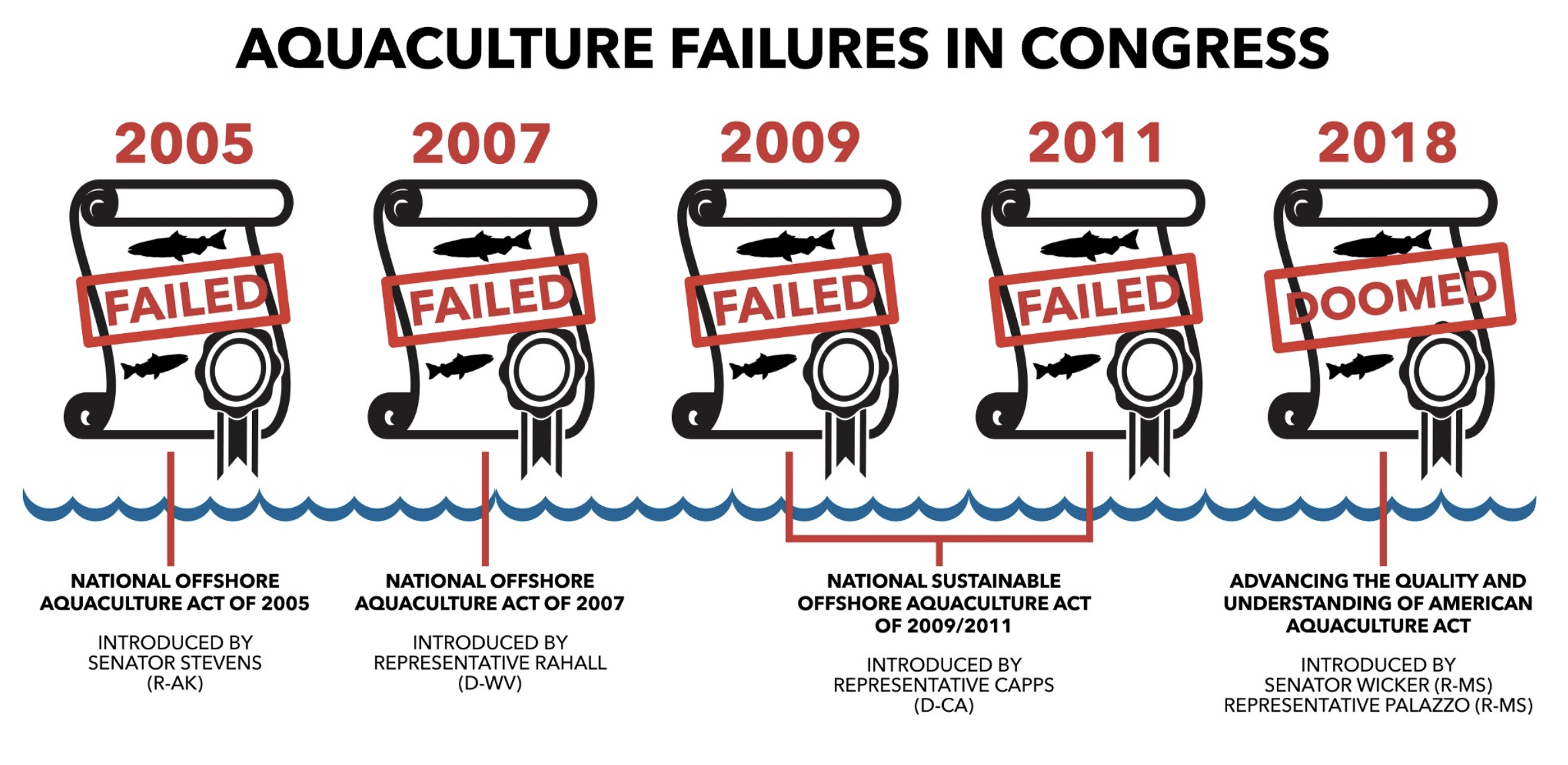- Blog
- Oceans
- Industrial Ocean Fish Farming
- It’s not deja vu. Congress really is trying to pass another failing industrial ocean fish farm bill.
It’s not deja vu. Congress really is trying to pass another failing industrial ocean fish farm bill.
by Hallie Templeton, senior oceans campaigner

Donate Now!
Your contribution will benefit Friends of the Earth.
Stay Informed
Thanks for your interest in Friends of the Earth. You can find information about us and get in touch the following ways:
Those who do not learn history are doomed to repeat it. Looks like Congress is doomed — yet again — by trying to legitimize floating factory farms in our oceans without learning from past failures.
Rep. Steven Palazzo, R-Miss., has introduced H.R. 6966, a companion bill to the Advancing the Quality and Understanding of American Aquaculture (or AQUAA) Act, S.3138, which Sen. Roger Wicker, R-Miss., introduced in June. These bills seek to establish a permitting regime for industrial ocean fish farms in public waterways and places regulation of the industry with the National Oceanic and Atmospheric Administration.
Unfortunately, the attempt to legitimize this unwanted industry is far from original or unique. We saw similar legislation fail to progress through each Congress from the 109th through the 112th. First, Sen. Ted Stevens, R-Alaska, introduced the National Offshore Aquaculture Act of 2005. History repeated itself with the National Offshore Aquaculture Act of 2007, from Rep. Nick Rahall, D-W.Va. And, yet again with Rep. Lois Capps’s, D-Calif., National Sustainable Offshore Aquaculture Act in 2009 and 2011.
Feeling dizzy? So are we.
Industrial ocean fish farming — also known as marine finfish aquaculture or open ocean aquaculture — is the mass cultivation of finned fish in ocean-based net pens, pods and cages. Essentially, these facilities are floating factory farms that can devastate the ocean ecosystem and hurt our wild-capture fishing industry. Other countries that host this industry, like Norway, Scotland and Canada, have had disastrous aquaculture-related incidents, including catastrophic fish escapes, depleted wild fish stocks and wildlife fatalities. In August 2017, a fish farm off Washington state’s coastline spilled more than 263,000 farmed Atlantic salmon into Puget Sound. The state legislature swiftly responded with a statewide ban on fish farms for non-native species.
It is clear that this industry has no place in our waters. Which begs the question: why is Congress still pushing? Perhaps it’s because Congress sees more value in corporate profits than in protecting the health and sustainability of our wild fish stocks. Thankfully, Congress took a break from pushing the stale issue for several years. But now it rears its ugly head in the 115th Congress with the AQUAA Act.
The companion legislation comes as no surprise in light of a recent federal court opinion rejecting NOAA’s attempts to permit industrial ocean fish farms in the Gulf of Mexico. In response to the setback, NOAA and the industry have increased pressure on Congress to act, and certain members of Congress are quick to meet their demands.
While Congress spins its wheels, technology has progressed significantly. We now have the availability of recirculating aquaculture systems, which can utilize regenerative energy, filter and reuse all of the water and produce healthy, farmed fish (and veggies!) with none of the havoc. These closed-loop systems do not directly discharge fish waste and other toxins into our public waterways. There is no need to administer veterinary or agricultural drugs because disease and pests are not a problem. Farmed fish spills and marine mammal entanglements are a thing of the past with this new technology. We can continue to feed the global population without further industrializing our oceans by utilizing recirculating systems and through sustainable wild-capture fishing, agroecological shellfish, and plant mariculture in the open ocean.
Act now! Tell Congress to get with it: Don’t cage our oceans!
